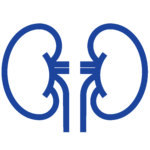Nephrology
Singing River Health System’s Board Certified Nephrologists diagnose and treat kidney disease in patients staying at Pascagoula Hospital and Ocean Springs Hospital as well as in their outpatient clinics.

Diagnosis and Treatment for Kidney Disease on the Mississippi Gulf Coast
Singing River Health System partners with the Board Certified Nephrologists of Kidney Disease and Hypertension Centers in order to provide our patients the most experienced professionals working in nephrology on the coast.
These nephrologists help provide 24/7 coverage of our patients and Pascagoula Hospital and Ocean Springs Hospital. If you are a guest of Singing River Health System, a kidney disease expert is always available.
About Nephrology
Nephrology is concerned with the diagnosis and treatment of diseases of the kidneys.
We treat kidney failure, polycystic kidney disease, kidney disorders as a result of diabetes, kidney disorders as a result of high blood pressure, chronic kidney disease and autoimmune diseases such as lupus, which may affect the kidneys.
Diagnosing Kidney Disease
We test for kidney diseases and disorders using blood and urine tests. Blood tests analyze how much blood your kidneys can filter per minute. Urine tests look at your protein levels. Elevated protein in urine could be a sign of kidney problems.
Treating Kidney Disease
Pascagoula Hospital and Ocean Springs Hospital each offer Acute Kidney Units and Inpatient Dialysis Units in which we offer Hemodialysis.
Dialysis
Kidney failure may result in you requiring dialysis to replace the normal functions of the kidneys. Dialysis works by removing waste and excess water from your blood supply and returning clean blood to the body.
Dialysis does not hurt, but you may find yourself getting light-headed or dizzy during treatment. This is normal.
Hemodialysis should be covered by your insurance plan.
Medication
We prescribe medications in cases where systemic disorders may be causing your kidneys to not perform properly.
CRRT
Continuous renal replacement therapy (CRRT) can be used for critically ill patients in the Intensive Care Unit.
FibroScan
What is a FibroScan?
FibroScan is the recognized standard for non-invasive assessment of liver health. It is FDA cleared as an aid to diagnosis and monitoring of adult patients with liver disease, as part of an overall assessment of the liver.
FibroScan works by emitting a pulse of energy, which patients feel as a slight vibration on their skin. It then measures the speed of this energy to rapidly determine liver stiffness and ultrasound attenuation, both of which can be used as a part of a broader evaluation of liver health.
FibroScan examinations are covered by most insurance plans.
How is a FibroScan examination performed?
Patient lies comfortably, with the right arm raised behind their head. The operator applies a water-based gel to the skin and positions the probe with a slight pressure.
The exam only takes about 5-10 minutes and is painless as well as non-invasive. It can also be repeated safely in the case of active liver disease.
FibroScan® is FDA-cleared to quantitatively measure liver stiffness and ultrasound attenuation—providing important information for treating patients across the spectrum of liver disease. It is the reference for the non-invasive
assessment of liver histology in the major international guide lines across many etiologies including HCV, NAFLD/NASH, and HBV.
Benefits of a FibroScan examination:
• Painless 10-minute procedure
• Examined area is 100x the size of a needle biopsy
• Consistent results
• Covered by most insurance plans
For more information click here.





